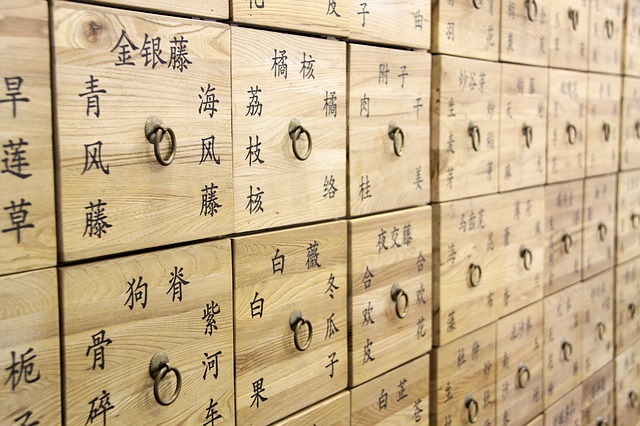Menopause: the second spring
In Traditional Chinese Medicine, menopause is referred to as the “second spring”. That sounds great, doesn’t it? It also tells us how much strength and renewal awaits us in the second half of life.
Peri- and menopause are experienced very differently from woman to woman. Peri-menopause is the period of time in which the body makes the natural transition to menopause. During this time we can have stronger, milder or irregular periods. When we haven’t menstruated for 12 consecutive months we have officially reached menopause.
In the transition period and as well in menopause, some suffer from sweats, sleeping disorders and dizziness. Others complain about migraines, eczema, palpitations and depression. While others can go through this life phase without marked symptoms.
In many countries and cultures, older women are considered wise and very respected, and experience more recognition than in our Western culture. The absence of menstruation is seen as a natural part of life, it’s welcomed and celebrated. Menopause is not a disease, but a completely natural process. It’s another special phase in the life of a woman to be consciously experienced, and lived through.
In Western society, where menopause is seen as a weakness and a decrease in life energy, women often experience very severe symptoms.
What happens energetically during menopause?
In order to maintain health for as long as possible, it is important to ensure a balance of the energies yin and yang. Yin is water and therefore cooling and absorbing. It reflects in blood, juices and substance. Yin nourishes and moisturises the tissues and organs, calms our nerves thus ensuring a restful sleep. Yang is fire, it is dynamic and gives us drive. It has a warming effect, gives us energy, joie de vivre and promotes and warms the functions of the tissues and organs. Both are equal parts of a whole and interdependent.
A woman’s menstrual cycle reflects her state of hormonal balance. When her yin and yang are balanced she has a regular cycle with moderate blood flow. The monthly bleeding cools and detoxifies the body, cleaning her uterus, cervix and vagina. It’s therefore unhealthy to suppress menstruation.
Many women suffering from: sleep problems, hot flashes, mood swings and acne, experience an improvement when the period arrives and the days after. The reason is that the body gets rid of excess heat and toxins. If you suffer from hot flashes and night sweats during the menopause, you will notice exactly this phenomenon: too much heat remains in the body due to less frequent or no bleeding.
As we get older, we automatically produce less and less blood and qi, less yin and yang. In order to protect the precious yin energies, so they are still available to us in the second half of life, the monthly bleeding stops gradually. The “heavenly water” becomes less and less and eventually stops flowing. Due to the lack of blood loss, the body regains energy. Some women experience this as a real high.
This period of change takes place mostly between the ages of 40 and 50 and lasts for different lengths of time. Depending on the constitution and lifestyle of a woman it can manifest itself in different symptoms.
Typical complaints in menopause can be
- vaginal dryness
- hot flashes, chills
- night sweats
- palpations
- sleep problems and insomnia
- mood changes, irritability, restlessness
- anxiety, panic, nervousness
- inability to concentrate
- dizziness
- tiredness
- eczema
- tinnitus
- dry eyes
- dry skin and mucous membranes
- hair loss
- itchy skin
- exhaustion, lack of drive
- lack of libido
- bladder weakness, urine leakage
- weight gain, slowed metabolism
- headaches
- breast soreness
- osteoporosis
- joint pain
- digestive problems
Stay connected and drop by on FACEBOOK and INSTAGRAM.

Menopause and our kidneys
In TCM, the kidneys are responsible for the process of ageing. They are the root of our body’s yin and yang. As we get older, the kidneys’ yin and yang decrease. The kidney is the big central store of all our powers and vital life substance (essence). In the course of our lives, essence and yin and yang decrease more and more. It’s desirable, and very helpful, when this happens at a steady pace so the body slowly gets used to the changes.
However, our current way of life often leads to a faster decrease in yin energy. Women also consume yin through their menstrual period and pregnancies. Too much stress, pressure to perform and excessive physical exertion. Computers and cell phones, lack of sleep, poor diets and fast food affect us in the course of our lives.
Kidney-yin corresponds to the parasympathetic nervous system and is responsible for restoration and regeneration. When deficient it can show symptoms of
- night sweats and hot flashes
- afternoon heat
- restlessness and anxiety
- ringing in the ears and hearing problems
- palpitation
- insomnia and sleeping disorders
- dry skin, eyes and mucous membranes
- vaginal dryness
- a pale face with flushed red cheeks
- a red peeled tongue
- dark scanty urine
Kidney-yang is the foundation of the yang qi in the whole body. Its mission is to warm the whole body to promote the proper functioning of all organs and tissues. When deficient we can experience symptoms of
- exhaustion
- difficulty concentrating
- loss of joie de vivre and vitality up to depression
- feeling cold and aversion to cold
- declining or loss of libido
- difficulty in urination and incontinence
- water retention and edema
There is often a mixture of the two: heat alternates with cold.
How we experience menopause therefore depends on how well we have taken care of our kidneys and taken care of our female health in the course of living. Our eating and living habits, but also our emotional life have a big impact on the health and energy of the kidneys.
A kidney yin or yang deficiency often shows up with a liver-qi stagnation. Women who have experienced long-term stress in their relationships, have a general frustration in life and overworked for many years often have a stagnant liver-qi. They have the impression that their life isn’t flowing and have feelings of frustration, resistance and feel pressure in their chest.
Common symptoms of liver-qi stagnation are
- alternating digestive complaints that get worse especially when stressed (esp. change of diarrhoea and constipation)
- irregular menstruation and PMS complaints
- mood swings
- prone to frustration and irritability
- headaches and migraines
- weather sensitivity
- lump in throat
- frequent sighing
Regular and moderate exercise helps to move our liver-qi, especially when done in nature. A deep and conscious breathing stimulates our parasympathetic nervous system and helps to relax and to stay calm.
Causes of menopausal problems
As stated above there are many women who transit through menopause without any marked symptoms. In Chinese medicine we already see in the years before menopause if a woman will pass this period smoothly or not.
Some factors that certainly negatively influence the state of the menopausal years are:
Overwork
Working long hours with insufficient periods of rest which often result in lack of movement. It also promotes eating under stress which weakens kidney-yin.
Emotional stress
Emotional stress is one of the most common causes for menopausal problems. When experienced over many years, kidney-yin is weakened by fear, anxiety and guilt. Whereas liver-qi becomes stagnant by recurrent feelings of anger, frustration and suppressed emotions.
Smoking
Smoking tobacco injures lung-yin and dries blood and fluids in the body. Over time it weakens kidney-yin. It also can aggravate feelings of grief, sadness and worry.
Eating irregular meals and dairy
Irregular meals, consuming poor diet and dairy foods and / or overeating weakens spleen-qi. It can also cause the formation of phlegm. As a result, slower metabolism, tiredness, oedemas and other symptoms can occur.
Coffee and alcohol
They are both yang in nature and consumed on a regular basis can worsen menopausal problems.
See also my article “Coffee – Is it good or bad for your health?”

TCM nutrition for menopause
“Let food be your medicine”
In TCM, foods are classified according to their thermal properties and their effect on the individual.
In general, you could say that foods that grow in summer, and in the South tend to have a cooling effect. Whereas foods that grow in winter, and in the North tend to have a warming effect.
The yin and fluids of the body can be supported via the diet, so that the body does not run so hot. Remember that yin has cooling properties and during menopause many women experience an excess of yang. That’s why we want to make sure to especially nourish our yin during these years.
Foods from the neutral to slightly cooling category and juice-building foods should be on the menu more often. As a result, foods with warming and heating properties should be avoided.
9 diet tips for progressing smoothly through menopause
1. Consume mineral-rich foods and water
They are especially good to nourish your kidney-yin. Dark leafy veggies, lentils, seaweed, wild-caught fish, fermented foods, bone or vegetable broth, black sesame, millet, amaranth and quinoa.
I highly recommend Quinton plasma seawater for boosting the kidney-yin.
2. Eat foods with slightly cooling and refreshing properties
Preference is for cooking methods like soups, stews and compotes as they help to fight symptoms of dryness and heat. All vegetables and esp. soybean, dandelion, radicchio, chicory, tomato, aubergine, avocado, asparagus, beetroot, carrot, pumpkin, red berries, goji berry, pear and apple are preferable.
3. Reduce coffee and alcohol
It’s even better if you avoid both of them when suffering from any symptoms of heat and dryness. Both have heating and drying properties, weaken the kidney-yang and if consumed regularly promote liver-qi stagnation.
4. Eat regular and at similar times
Eating regularly, and ideally at similar times, is important to calm the nervous system and to keep blood sugar levels balanced. During menopause the body is going through a lot of changes and eating at regular times helps the body in finding balance again.
5.Drink mainly hot water and herbal teas
Hot water strengthens the digestion and helps to rinse away any toxins.
Herbal teas which are especially recommended during menopause are: Monk’s pepper, sage, blackcurreat leaf tea, black cohosh, shepherd’s purse, passionflower herb and dandelion.
6. Avoid spicy herbs
They have a heating and drying effect and esp. chilli, pepper, pimento, dried ginger, curry, horseradish and garlic should be avoided. Fresh ginger, cinnamon, anise and nutmeg can be eaten in moderation but should be avoided when hot flashes or night sweats are present.
7. Avoid drying and / or heating drinks
Keep your hands off these drinks when suffering symptoms of heat or dryness: green and black tea, chai tea, ginger tea, red wine, high percentage alcohol and cacao milk.
8. Avoid grilled, fried and deep-fried foods
These preparation methods have a heating effect and should therefore be avoided. They can heat up the body even more and worsen symptoms like insomnia, irritability, hot flashes and night sweats. It is better to boil, steam and bake food.
9. Avoid foods that have a hot and drying effect
Besides the above-mentioned spices and drinks, the following foods should be avoided as well: Lamb, game, loaf, mould cheese, sugar and candy.
Stay connected and drop by on FACEBOOK and INSTAGRAM.
Also see my other articles concerning menopause
Wheat Berry Tea for Better Sleep and Fewer Sweats
Menopause Hot Flashes & Sweating: 6 Natural Ways to Control it
Sleep Problems & Heart Palpitations – How a Change in Diet and Chinese Medicine Can Help


